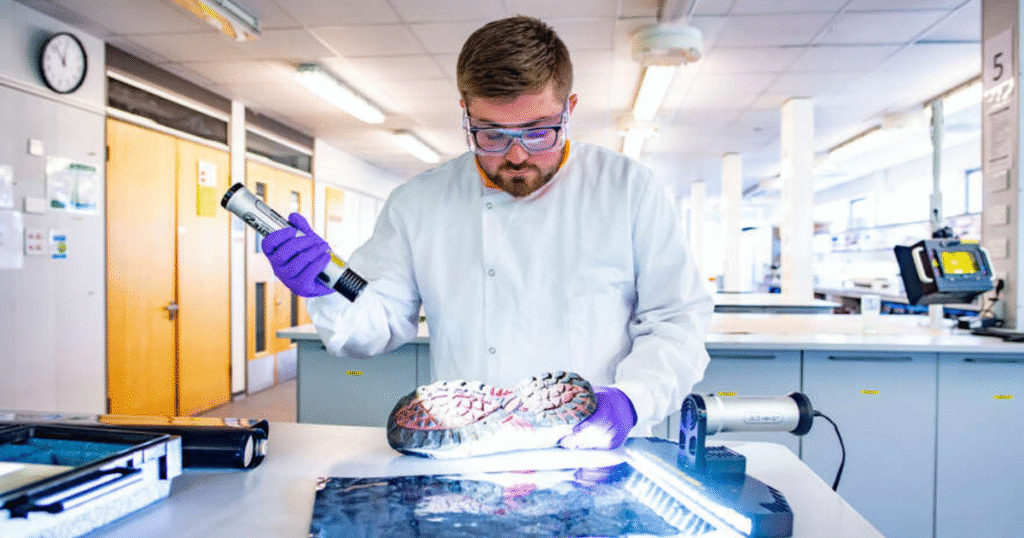Forensic science is the application of scientific methods to solve criminal cases. It plays a crucial role in the criminal justice system. Forensic scientists collect, preserve, and analyze evidence to help solve crimes. In the UK, forensic science is a well-respected field of study.
Forensic science is diverse. It includes areas like toxicology, DNA analysis, crime scene investigation, and more. Universities in the UK offer both undergraduate and postgraduate degrees in forensic science. These courses prepare students for careers in law enforcement, research, and legal professions.
This article will explore the forensic science courses offered by UK universities. It will also cover the course content, career opportunities, and the skills you will learn. Studying forensic science in the UK gives students access to world-class education and resources.
introduction To Forensic Science
Forensic science involves using science to investigate crimes. It combines different fields like biology, chemistry, and physics. The goal is to find evidence that can help solve a crime.
Forensic scientists work with law enforcement agencies to analyze evidence from crime scenes. This evidence can include DNA, fingerprints, blood samples, and more. Forensic science is essential for solving cases and bringing justice.
Why Study Forensic Science in The UK?
Studying forensic science courses in the UK offers many benefits. The UK has a long history of forensic science, with many universities offering high-quality programs. These universities provide up-to-date courses that teach the latest techniques in forensic science.
Students also have access to state-of-the-art labs and equipment. The UK is home to many renowned forensic experts, making it a great place to learn. In the UK, many universities offer forensic science courses. These courses provide students with the knowledge and skills needed to work in this exciting field.
Top Universities For Forensic Science in The UK
These universities provide high-quality education and practical experience in criminal investigation, evidence analysis, and lab work. Several UK universities offer forensic science courses. Some of the top universities include:
- University of Glasgow
- University of Leicester
- University of Dundee
- University of Central Lancashire
- University of Lincoln
These universities provide excellent programs and have a good reputation in the field of forensic science. They offer courses at undergraduate, postgraduate, and doctoral levels.
Forensic Science Undergraduate Courses
Undergraduate courses in forensic science typically last for three years. These courses teach students the basics of forensic science. Students learn about crime scene investigation, evidence collection, and analysis techniques. Many courses offer practical experience through laboratory work and internships. Some common undergraduate degrees in forensic science include
- BSc in Forensic Science
- BSc in Forensic and Analytical Science
- BSc in Forensic Investigation
They also study subjects like criminology, law, and ethics. These degrees prepare students for careers in crime scene investigation, laboratory analysis, and criminal justice.
Postgraduate Forensic Science Courses
Postgraduate courses in forensic science are ideal for students who want to specialize in the field. These courses provide advanced knowledge and practical skills. They also focus on the latest research and techniques in forensic science. Postgraduate courses typically last one year and may include a research project.
Some common postgraduate degrees in forensic science include:
- MSc in Forensic Science
- MSc in Crime Scene Investigation
- MSc in Forensic Psychology
These degrees are perfect for students who want to work in specialized roles such as forensic toxicology, forensic pathology, or digital forensics.
Doctoral Programs in Forensic Science
Doctoral programs in forensic science are for students who want to pursue a career in research or academia. These programs allow students to conduct original research in the field. PhD programs in forensic science typically take three to four years to complete.
Students work closely with faculty members to conduct experiments and write a dissertation. A PhD in forensic science opens doors to a career in research, teaching, or forensic consulting.
Course Content in Forensic Science Degrees
The course content includes topics like biology, chemistry, and law, which are essential for understanding how to solve crimes. Students learn about forensic biology, crime scene investigation, and toxicology. Forensic science degrees cover a wide range of topics. Some of the main areas of study include:
- Crime scene investigation techniques
- Forensic biology and chemistry
- DNA analysis and fingerprinting
- Forensic toxicology
- Digital forensics
- Forensic pathology
- Law and ethics in forensic science
- Evidence collection and preservation
Many programs also offer internships to give students real-world experience in the field. Students also learn about the use of advanced technology in forensic science, such as microscopes and DNA sequencing machines.
Skills Developed in Forensic Science Courses
Forensic science courses help students develop a range of skills. Some of the key skills include:
- Critical thinking: Forensic scientists must analyze evidence and make decisions based on facts.
- Attention to detail: Forensic scientists must carefully examine evidence and look for small clues that may help solve a case.
- Technical skills: Students learn how to use laboratory equipment and software for data analysis.
- Communication skills: Forensic scientists must communicate their findings clearly in reports and presentations.
- Problem-solving: Forensic scientists must think creatively to solve complex problems.
These skills are essential for working in the forensic science field and can be applied in many other careers.

Practical Experience in Forensic Science Courses
Many forensic science courses include practical experience. Students get the chance to work in labs and participate in crime scene simulations. This hands-on experience helps students understand how to apply their knowledge in real-world situations.
Some universities also offer internships with law enforcement agencies or forensic labs. These internships provide valuable experience and help students build connections in the industry. Practical experience in forensic science courses at UK universities is an important part of the learning process.
Students get hands-on training in real-life labs, where they work with forensic tools and equipment. This experience helps them understand how to gather and analyze evidence from crime scenes. Many universities also offer opportunities for internships in forensic labs or law enforcement agencies.
Career Opportunities in Forensic Science
Graduates of forensic science programs have many career options. Some common careers include:
- Forensic scientist: Analyzing evidence and helping solve crimes.
- Crime scene investigator: Collecting and preserving evidence from crime scenes.
- Forensic toxicologist: Analyzing drugs, alcohol, and other substances found in the body.
- Digital forensic investigator: Investigating cybercrimes and analyzing digital evidence.
- Forensic pathologist: Studying cause of death and conducting autopsies.
Forensic science graduates can also work in research, education, or forensic consulting. The demand for forensic scientists is growing, making it a promising career choice.
Admission Requirements For Forensic Science Courses
The admission requirements for forensic science courses vary by university. However, most universities require applicants to have:
- A strong academic background, usually with good grades in science subjects.
- A high school diploma or equivalent qualification.
- English language proficiency, if English is not the applicant’s first language.
- Some universities may also require an interview or entrance exam.
It is important to check the specific admission requirements for each university.
Cost Of Forensic Science Courses in The UK
The cost of forensic science courses in the UK varies depending on the university and the level of study. On average, undergraduate courses cost between £10,000 and £38,000 per year for international students.
Postgraduate courses can cost between £12,000 and £45,000 per year. Students can also apply for scholarships, grants, and loans to help cover the cost of their education.
Student Life in The UK
Studying forensic science in the UK offers students a chance to experience life in a vibrant and diverse country. UK universities are home to students from all over the world. Students can enjoy a variety of activities, including sports, clubs, and social events.
The UK also has many cultural attractions, from historical landmarks to modern entertainment. Living in the UK can be an exciting and enriching experience.
Accreditation Of Forensic Science Programs
Accreditation is an important factor to consider when choosing a forensic science program. Accredited programs meet high academic and professional standards. In the UK, the Forensic Science Society (FSS) accredits many forensic science programs.
Accreditation ensures that the program provides a quality education and prepares students for careers in forensic science.
Challenges in Forensic Science Education
Forensic science education can be challenging. The field requires a strong understanding of science and technology. Students must also be able to work under pressure and handle sensitive information.
Some forensic science programs also require students to complete challenging practical assessments. Despite these challenges, many students find forensic science to be a rewarding and fulfilling field of study.
Technological Advances in Forensic Science
Forensic science is a rapidly evolving field. Technological advances have revolutionized the way evidence is collected and analyzed. New techniques, such as DNA sequencing and advanced microscopy, have made it easier to solve crimes.
Digital forensics is another growing area, as more crimes are being committed online. Forensic science students must stay up-to-date with the latest technologies to succeed in the field.
Future Of Forensic Science in The UK
The future of forensic science in the UK looks bright. The field is growing, with new technologies and methods emerging all the time. There is a strong demand for forensic scientists, especially in areas like digital forensics and forensic toxicology.
Some forensic science programs also require students to complete challenging practical assessments. The UK is a leader in forensic science research, and students who graduate from UK universities are well-prepared for careers in the field.

Frequently Asked Questions
What is forensic science?
Forensic science involves using scientific methods to investigate crimes. It includes analyzing evidence such as DNA, fingerprints, and blood samples to help solve cases.
How long does it take to complete a forensic science degree?
An undergraduate degree in forensic science typically takes three years. Postgraduate degrees usually take one year, while a PhD can take three to four years.
Do I need a science background to study forensic science?
Yes, most forensic science courses require a strong background in science, especially in subjects like biology and chemistry.
What career options are available after studying forensic science?
Graduates can work as forensic scientists, crime scene investigators, forensic toxicologists, or digital forensic investigators, among other roles.
Final Thoughts
Forensic science courses in UK universities provide students with the knowledge and skills needed to succeed in this fascinating field. The UK is home to some of the best forensic science programs, offering students practical experience and access to cutting-edge technology.
Whether you’re interested in crime scene investigation, DNA analysis, or digital forensics, a forensic science degree from a UK university can open many doors. With a growing demand for forensic scientists, this field offers exciting career opportunities.

